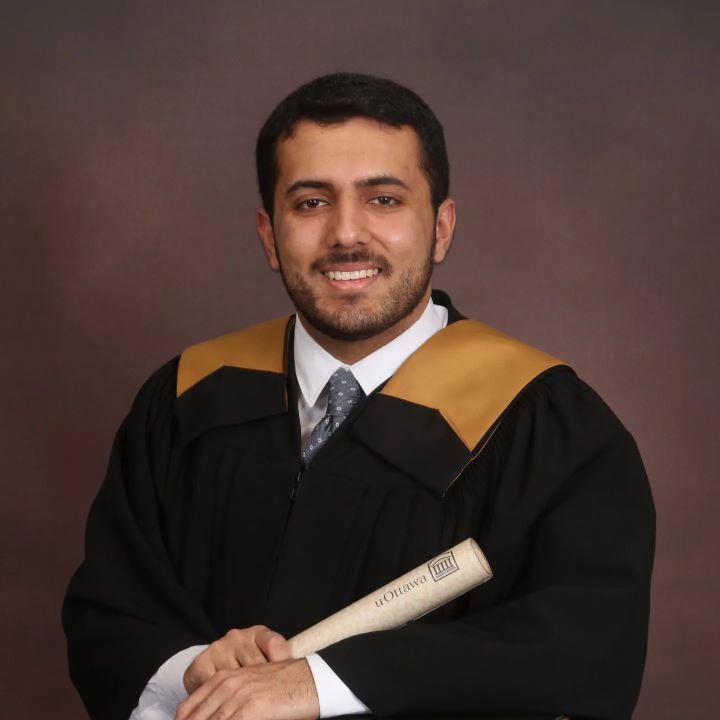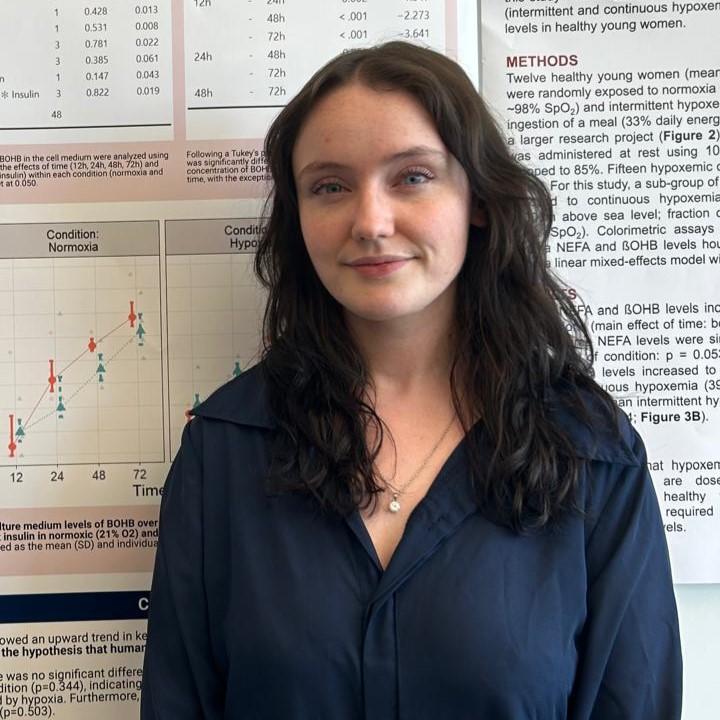To help guide you through that decision-making process, Mykal Ibrahim, who’s starting the second year of a master’s in public and international affairs at uOttawa’s Graduate School of Public and International Affairs, and Alexanne Larocque, who’s completing the second year of a master’s in human kinetics, will share their insights as student panellists at uOttawa’s Graduate and Professional Studies Information Fair September 15.
Both Mykal and Alexanne agree that doing a master’s is a deeply enriching experience, which has let them dive deeper into their research interests, expand their networks, refine their skills and further specialize as they zero in on specific career paths.

“With increased use of AI, specialization can set you apart, and deep expertise matters.”
Mykal Ibrahim
— Master’s in public and international affairs, second year
“As you improve your current skill sets and develop new ones, you are shaped to thrive better in roles that are much less automated, such as those requiring critical thinking, creativity, research and domain-specific expertise,” says Mykal. “Graduate programs and professors can also connect you directly with employers and institutions looking to hire recent graduates. From networking opportunities to internship postings, a master’s can serve as a boost to your career in this tough job market.”

“By pursuing a master’s and even a PhD, students have the opportunity to build connections, build their resumé and also explore different topics.”
Alexanne Larocque
— Master’s in human kinetics, second year
Alexanne says: “We still need specialized professionals, no matter how much AI permeates the job market. AI seems to be taking over a lot of entry-level jobs, which can be really demoralizing for new graduates who are looking to get their careers started but don't have any experience. I think pursuing a graduate degree can help students stand out in the hiring process and make them more suited to jobs that still rely on human performance.”
Mykal works for the Department of Finance Canada in international finance policy. He says the knowledge he’s gaining via his master’s program complements his current job but also matches his ambition to work in international affairs.
“My research interests are conflict resolution, humanitarian diplomacy, Canadian foreign policy and global financial crime,” says Mykal. “I have chosen to write a major research paper as part of my MA and will be examining, from a Canadian and international standpoint, how gaps in legal frameworks enable human trafficking via money laundering. Although it is not mandatory, it is highly favourable to hold a graduate degree to work in international affairs.”
Meanwhile, Alexanne is delving into research, specifically, the interaction between fat cells, low oxygen and ketone bodies such as the keto diet and whether adding ketones to fat cells can help lower inflammation, under the supervision of human kinetics professor Pascal Imbeault. Alexanne says she only decided to pursue a master’s in human kinetics during her final term as an undergraduate, but she hasn’t looked back.
“I had applied and got accepted into the new PharmD program at uOttawa, but I was also doing an honour’s project for my undergrad at the time, and I really fell in love with research,” says Alexanne. “I realized that doing a master’s was more aligned with my interests, and although I wasn’t sure where it would lead me, I knew I would enjoy being in the lab and pursuing my studies in a field that is so interesting. Even if you’re not sure where it’s going to lead you career-wise, the things that you learn and the tools and connections that you develop are absolutely priceless.”
So how can undergraduate students assess whether a master’s is good for them?
“Identify your motivation behind it,” says Alexanne. “Are you doing it to increase your hireability? To figure out what topics interest you? To avoid having to decide on your career, etc.? I don’t think there’s any bad reason to do a master’s, as long as it’s something that you want to do, because that will give you the drive you need to see it through. Also, speak to different supervisors, find out what their research interests are, speak to their graduate students, visit their labs and really think about if this is something you can see yourself doing for two years.”
Mykal adds: “Don’t factor in the stress of how challenging the readings and assignments will be, or how many research papers you will have to write in a short time. See this as a learning opportunity in which you are either deepening your understanding of one topic or discovering a new one. Even in those moments, it can be an engaging and rewarding experience.”
Upper-year undergraduate students can discover more insights about graduate studies from uOttawa’s leading professors, vice-deans, and Mykal and Alexanne at the Graduate and Professional Studies Information Fair September 15.
Register for the Graduate and Professional Studies Information Fair.
Schedule and panellists
Panel 1 (3:30 p.m. to 4:30 p.m.)
• Christine Dallaire – vice-dean, academics, Faculty of Health Sciences
• Deryn Fogg – vice-dean, graduate studies, Faculty of Science
• Nadine Wiper-Bergeron – vice-dean, graduate and postdoctoral studies, Faculty of Medicine
• Andrew Sowinski – vice-dean, programs, Faculty of Engineering
· Alexanne Larocque – MSc candidate in human kinetics – Faculty of Health Sciences
Panel 2 (4:30 p.m. to 5:30 p.m.)
• Brian Ray – vice-dean, research, Faculty of Arts
• E. Yaya Koné – vice-dean, graduate studies, Faculty of Education
• Sylvie Frigon – vice-dean, graduate studies, Faculty of Social Sciences
· Mykal Ibrahim – MA candidate in public and international affairs – Faculty of Social Sciences
